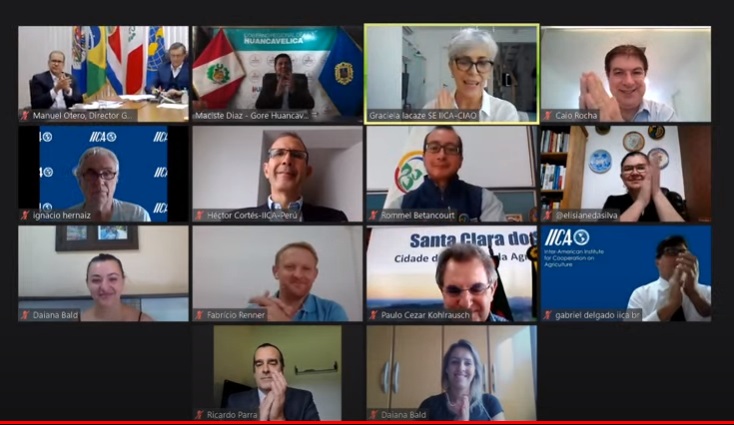IICA to support organic production in the Peruvian region of Huancavelica and the Brazilian municipality of Santa Clara do Sul

Buenos Aires, 11 March 2021 (IICA). The Inter-American Institute for Cooperation on Agriculture (IICA) will work together with the Brazilian municipality of Santa Clara do Sul and the Peruvian region of Huancavelica on various projects to strengthen and position these localities as models of organic production, pursuant to an agreement signed between the three parties that acknowledges the efforts of these local governments in promoting this type of agriculture.
The municipality of Santa Clara do Sul is currently implementing the "Santa Clara Mais Saudável" program to promote a culture of production and consumption of pesticide-free healthy food. For its part, the Andean regional government has developed the "Huancavelica Región Orgánica" program, in order to increase the extension of the territories dedicated to organic production in Peru, reduce poverty rates, increase the income of producers and improve the quality of life of the communities of the region.
The agreement establishes that IICA, through its delegations in Argentina, Brazil and Peru, and with the cooperation of the Inter-American Commission on Organic Agriculture (ICOA), will support Huancavelica and Santa Clara do Sul in identifying successful experiences to be shared, and will also coordinate and facilitate the technical contributions that both governments require to further expand organic activity.
“The capital of Huancavelica is located at an altitude of 3,685 meters, but the region has many microclimates. This is the pantry of the world's biodiversity, because here we produce everything. People may consider this a poor region, but it is actually rich. Even with the pandemic, no one went hungry. We were locked up for several months and we survived with our agricultural production” explained Maciste Alejandro Díaz Abad, regional governor of Huancavelica.
“More than 70 percent of our people -he added- work in agriculture and livestock production. This activity is our future, and organic production will change the quality of life of the population. The consumption of organic products has increased across the world, and people have come to appreciate healthy foods more thanks to the pandemic ”.
For his part, the mayor of Santa Clara do Sul, Paulo Cézar Kohlrausch, celebrated the signing of the agreement as a source of “pride and joy” and underscored the importance of exchanging experiences with Huancavelica through professionals and technical experts who can collaborate with both governments. Kohlrausch pointed out that the choice to develop organic production is a "strategic approach" for the economic and social development of the municipality.
“We believe that sustainability is essential and that the production of healthy food must be the basis of an economy that cares about human beings. We are food producers. And we are committed to a production that preserves the health of the producer, the environment and the consumer” said the Brazilian mayor.
The Director General of IICA, Manuel Otero, indicated that the transformations in agriculture will only intensify, and that it is time to think not only in terms of volume but also of quality, that is, more nutritious and healthy foods.
In this sense, he stated that organic production “synthesizes the spirit of new productive approaches, because the agriculture of today must necessarily be in harmony with nature; the concept of extractive agriculture must be eradicated ”.
Otero commended the signing of the technical cooperation agreement as a first step for “these regions to partner up with others to increase the supply of healthy products, so that our rural areas become increasingly prosperous. Our commitment must be to ensure that this agreement improves the quality of life of our people in rural areas”.
The signing ceremony, carried out virtually, was moderated by ICOA's executive secretary, Graciela Lacaze, and featured the participation of IICA representatives in Argentina, Brazil and Peru; Caio Rocha, Héctor Cortés and Gabriel Delgado, respectively.
Also present were Rommel Betancourt, president of ICOA, and Ricardo Parra, head of the Argentine Movement for Organic Production (MAPO).
One of the objectives of the agreement is to increase the number of regions participating in the organic agriculture system, as an example of social, productive, commercial and environmentally sustainable production. The initiative also seeks to position organic agriculture as an innovative production system capable of contributing to gender equality and youth inclusion.
The agreement also specifically promotes cooperation on various objectives including certification for international markets, the adoption of new technologies, support for participation in the 2021 Madrid Organic Food Fair, relations with universities and the introduction of bioeconomy as a tool to improve productivity and make better use of resources.
The signing ceremony raised the interest of many different stakeholders, and was followed by 2,234 people in 16 countries in the Americas and Spain through social media and the different platforms on which the event was live streamed.
Caio Rocha, who is also IICA's Regional Coordinator for the Southern Region, explained that Huancavelica and Santa Clara do Sul were chosen because of the commitment their authorities have shown towards organic agriculture.
“The agreement will have a significant impact, as it will promote the exchange of experiences and the certification of organic products for markets such as Europe and the United States. We need to strive for a more sustainable agricultural production, and organic products are a great alternative" he added.
Finally, Mr. Parra underscored the fact that the agreement is not only useful to protect producers and consumers and preserve the environment, but also to strengthen the sense of belonging of food producers in rural areas. “Moving from the countryside to the city should be a choice, and not a necessity. We need the youth to stay in rural areas. And organic production is directly related to this expectation”.
More information:
Institutional Communication Division
comunicacion.institucional@iica.int